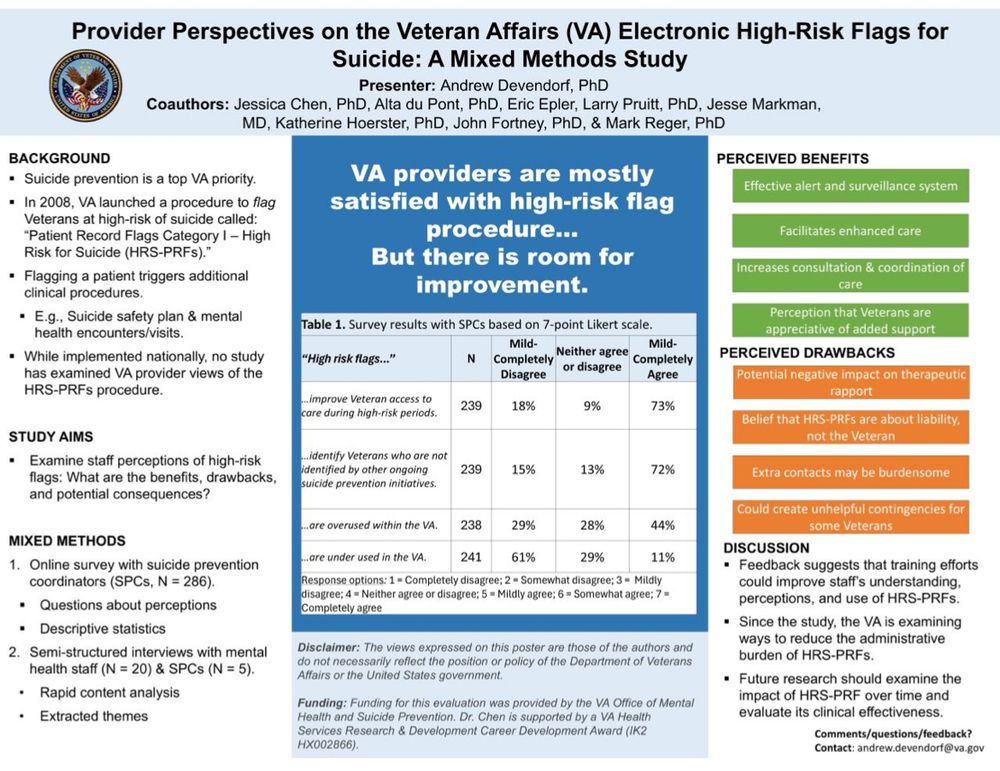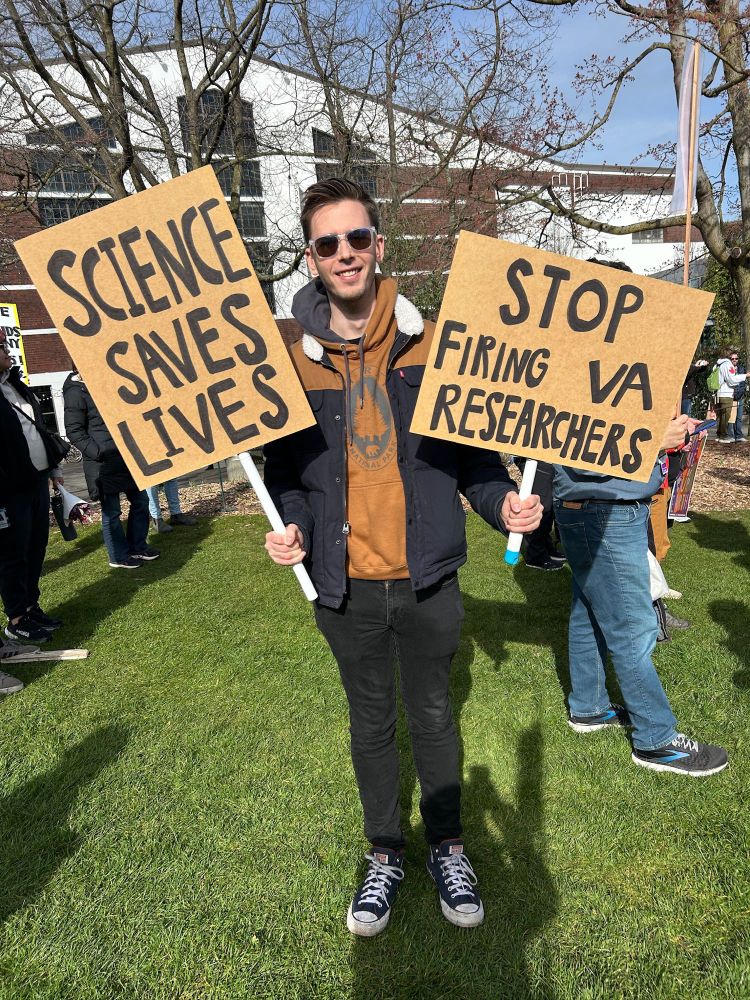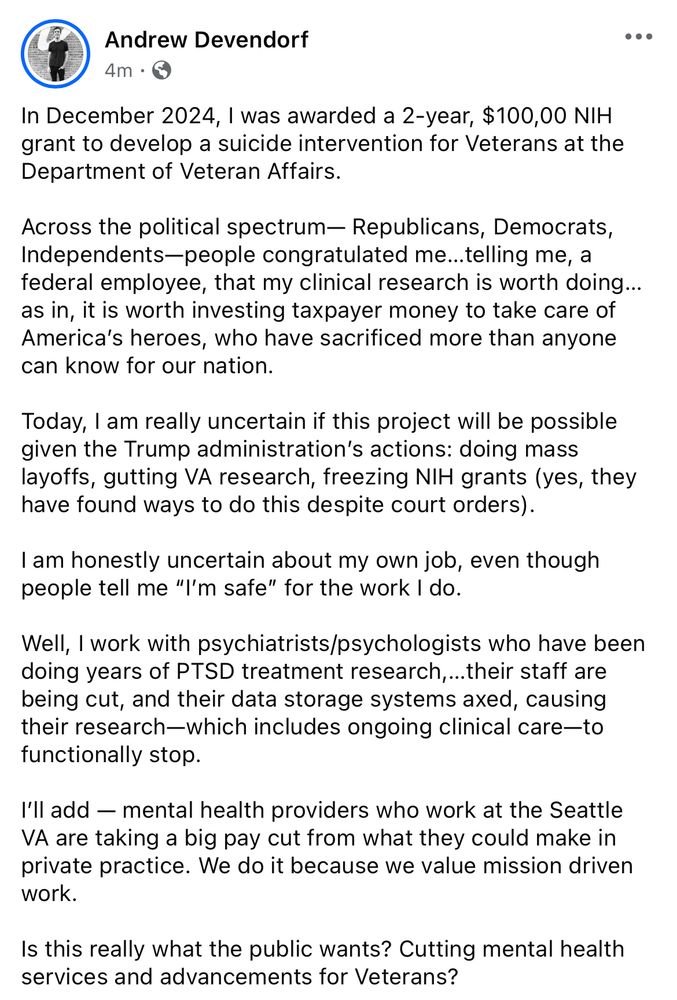This means I’m 95% of the way toward practicing as an independent psychologist.
Soon, I will launch my new practice & start taking clients…more info to come.
For now, here’s new headshot :)
Happy 4th of July, everyone!

This means I’m 95% of the way toward practicing as an independent psychologist.
Soon, I will launch my new practice & start taking clients…more info to come.
For now, here’s new headshot :)
Happy 4th of July, everyone!
The procedure is aimed to help providers identify Veterans who are at a high risk of suicide.
Our team did a quality improvement study to learn providers’ views on the process.
Check it out!

The procedure is aimed to help providers identify Veterans who are at a high risk of suicide.
Our team did a quality improvement study to learn providers’ views on the process.
Check it out!
The most compelling speech came from a pediatric cancer doctor…
He noted that, for many cancers, NIH-funded science has improved survival outcomes for child patients from 15% to 80%.
Science saves lives.
We must save science ✊

The most compelling speech came from a pediatric cancer doctor…
He noted that, for many cancers, NIH-funded science has improved survival outcomes for child patients from 15% to 80%.
Science saves lives.
We must save science ✊
I also do not feel safe at my job, despite being a psychologist.
Don’t you believe Veterans—our heroes—deserve the best health care?

I also do not feel safe at my job, despite being a psychologist.
Don’t you believe Veterans—our heroes—deserve the best health care?
There is nothing like it in the private sector.
In WA, alone, each $1 spent on NIH research yields a 79% return on investment
www.unitedformedicalresearch.org/nih-in-your-...

There is nothing like it in the private sector.
In WA, alone, each $1 spent on NIH research yields a 79% return on investment
www.unitedformedicalresearch.org/nih-in-your-...
1. Medication (47.4%)
2. Psychotherapy (42.8%)
3. Diet/exercise (28.4%)
4. Alternative treatments (22.6%)
5. Mindfulness practices (15%)
6. "Other" (8%, e.g., ECT therapy)
6/9

1. Medication (47.4%)
2. Psychotherapy (42.8%)
3. Diet/exercise (28.4%)
4. Alternative treatments (22.6%)
5. Mindfulness practices (15%)
6. "Other" (8%, e.g., ECT therapy)
6/9
Most videos presented depression as caused by biological (49.5%) OR environmental (41.3%) factors, but usually not both.
This is in contrast to the consensus in the mental health profession, which uses the biopsychosocial model for depression, presented in just 8% of videos.
4/9

Most videos presented depression as caused by biological (49.5%) OR environmental (41.3%) factors, but usually not both.
This is in contrast to the consensus in the mental health profession, which uses the biopsychosocial model for depression, presented in just 8% of videos.
4/9
-Causes
-Timeline
-Treatability
-Continuum presentation
-Treatment recommendations
-Strengths
Our framework was inspired by the Common Sense Model of Illness Beliefs.
3/9

-Causes
-Timeline
-Treatability
-Continuum presentation
-Treatment recommendations
-Strengths
Our framework was inspired by the Common Sense Model of Illness Beliefs.
3/9
The 2-year, $100,000 project will make me a Collaborating Scholar with University of Washington's Suicide Care Research Center.
Our aim is to co-design an intervention that equips Veteran loved ones with suicide intervention tools.
Abstract ⬇️


The 2-year, $100,000 project will make me a Collaborating Scholar with University of Washington's Suicide Care Research Center.
Our aim is to co-design an intervention that equips Veteran loved ones with suicide intervention tools.
Abstract ⬇️
Even though it’s Black Friday, journals still charge the same exorbitant amounts for articles.
C‘mon academia, where are the fire sales? 🤷♂️

Even though it’s Black Friday, journals still charge the same exorbitant amounts for articles.
C‘mon academia, where are the fire sales? 🤷♂️
Grad students have about 6x higher rates of moderate-severe depression & anxiety symptoms.
This work culture needs an upgrade.
www.nature.com/articles/nbt...

Grad students have about 6x higher rates of moderate-severe depression & anxiety symptoms.
This work culture needs an upgrade.
www.nature.com/articles/nbt...

